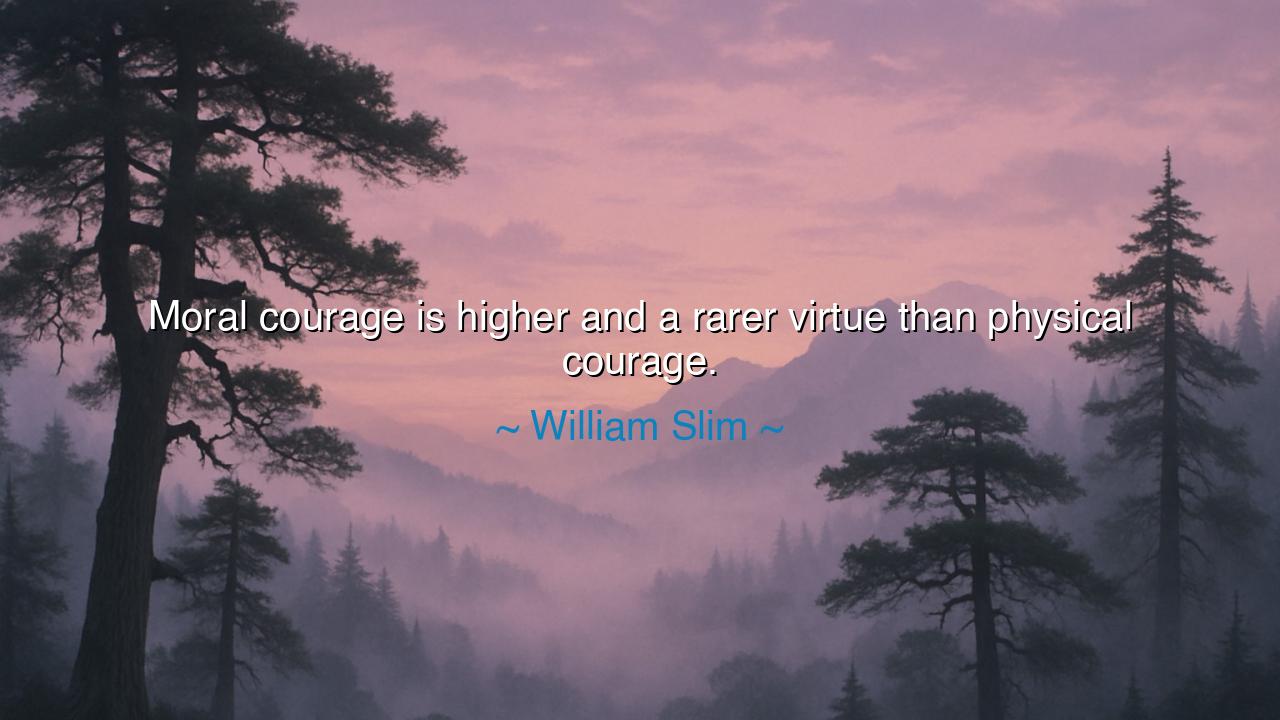
Moral courage is higher and a rarer virtue than physical courage.






The words of William Slim — “Moral courage is higher and a rarer virtue than physical courage.” — carry the resonance of timeless truth, born from the heart of a soldier who had seen the full measure of both kinds of bravery. Slim, a British field marshal who led men through the crucible of World War II, spoke not as a philosopher in peace but as a leader who had witnessed valor under fire and the harder, quieter valor of conscience. His words pierce to the soul of what it means to be truly courageous — for physical courage faces danger to the body, but moral courage faces danger to the spirit.
Slim understood the difference deeply. On the battlefield, he saw men rush into gunfire, stand unflinching before death, and endure unspeakable hardship for the sake of their comrades and their country. Yet he also saw that such physical courage, though noble, could often be drawn from instinct, duty, or the fierce momentum of battle. Moral courage, by contrast, demands solitude. It is the strength to stand alone when the crowd turns away; to speak the truth when silence would bring comfort; to act justly though the world rewards deceit. It is the courage of conscience — invisible, often unrewarded, but higher because it springs from the soul’s unyielding commitment to what is right.
The ancients, too, knew this distinction. Aristotle spoke of courage as the mean between fear and recklessness, but he reserved his highest praise for the courage of the mind and spirit. The Stoics — those quiet warriors of reason — believed that to suffer for virtue is greater than to die in glory. For the body’s pain passes quickly, but the wounds of the soul endure forever. So too did Slim recognize that the courage required to defy moral corruption or to hold to honor amid despair is rarer than the courage that faces bullets or storms. A man can steel himself against danger, but to stand against the condemnation of others — to face ridicule, exile, or shame for the sake of truth — this requires a strength few possess.
Consider the example of Socrates, who, when condemned by the city of Athens, refused to abandon his principles. Offered a chance to live if he would renounce his teachings, he chose instead to drink the hemlock, saying that a life without integrity was not worth living. This was not the courage of the soldier, but the courage of the soul. He did not fight with sword or shield, but with steadfastness, with faith in truth itself. His was moral courage — the willingness to die for one’s convictions, to preserve the sanctity of the inner self. History remembers him not for conquest, but for integrity — for the victory of conscience over fear.
Slim’s own experiences as a commander in Burma also taught him the cost of moral courage. There were moments when he had to make decisions that risked not only his reputation but the lives of men — decisions that demanded honesty, humility, and endurance under immense pressure. He knew that it was one thing to face the enemy across a battlefield, and another to face one’s own doubts, one’s own sense of responsibility. It takes a rarer kind of bravery to admit error, to tell hard truths to superiors, or to keep faith with one’s men when defeat looms. Such courage, unseen by the masses, is the essence of leadership and humanity alike.
Physical courage is admired because it is visible — it blazes like fire. But moral courage burns quietly, like the steady flame of a lamp that resists the wind. It may not inspire the cheers of the crowd, but it sustains civilization itself. Without it, nations fall into tyranny, truth withers, and justice dies. It is the moral courage of thinkers, reformers, and saints that has carried humanity forward — from Galileo, who faced the wrath of the Church for declaring that the Earth moves, to Martin Luther King Jr., who faced imprisonment and death for declaring that all men are brothers. These are the warriors of the spirit, the defenders of conscience.
So, my friend, remember this: the test of true courage comes not when the guns roar, but when the world is silent and your heart demands a stand. When you are tempted to remain quiet while others suffer, speak. When the easy road tempts you away from truth, resist. When doing what is right brings loss, do it still. For physical courage may win battles, but moral courage preserves the soul — and through it, the world.
Let the wisdom of William Slim guide your steps. Be brave not only in the face of danger, but in the face of doubt, disapproval, and injustice. Nurture that inner fortitude that allows you to act with integrity even when no one watches, to remain faithful to conscience even when it costs you dearly. For in the end, history forgets the noise of battle, but it remembers the quiet strength of those who stood for truth. And that — that is the highest courage of all.






AAdministratorAdministrator
Welcome, honored guests. Please leave a comment, we will respond soon